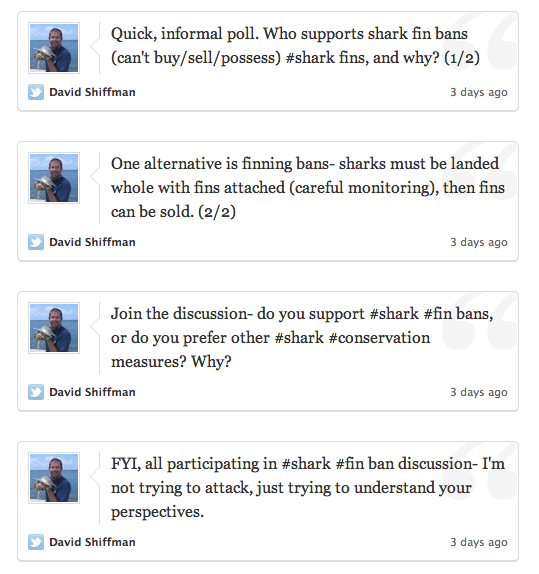There has been some important news this week about the global shark fin fishery problem.
First is a piece by Juliet Eilperin about the problem of illegal shark fishing in marine reserves. Just last week another boat was caught illegally harvesting sharks from a globally important reserve:
Local and regional authorities in Indonesia caught 33 poachers last week who had taken sharks, manta rays and sea cucumbers from a marine protected area that scientists have identified as one of the sea’s most important sites. But after confiscating their illegal catch and gear, the patrol officers had to let them go.
Now where have I heard this exact story before? Oh right – here.
The incident left conservationists and villagers frustrated, and underscores one of the biggest challenges in protecting the ocean: Setting aside swaths of the sea from fishing only works when there’s adequate enforcement.
The poached sharks, manta rays and sea cucumbers are all coveted by Asian consumers and were worth more than $160,000. Sharks are used to make shark’s fin soup, a Chinese delicacy, and sea cucumbers are sought by Japanese diners. Shark fishing is banned in the territory where the poaching took place, although Indonesia still boasts the world’s largest shark fishery, according to Conservation International.
Conservation International provides $200,000 a year to fund patrols in this region of Indonesian Papua. Last week’s patrol team — which included six community members, two Indonesian naval officers and a local police officer — confiscated illegal long-line fishing gear and air compressors, which are often used to illegally take fish from the sea floor.
Marine biologists who work in other remote areas of the Pacific have identified similar problems. Julia Baum, an assistant professor at British Columbia’s University of Victoria who just published a study showing reef sharks in the Pacific have declined by more than 90 percent in recent decades, wrote in an e-mail that she regularly sees a large fishing vessel in U.S. waters near Kiritimati atoll in the northern Line Islands while conducting field work, and this operation hires local villagers to cut fins from sharks. “The reserves are not good if they’re not well enforced,” said National Geographic explorer-in-residence Enric Sala, who has also worked in the Line Islands.
A second and related piece is a wonderful “storify” effort by WhySharksMatter (AKA David Shiffman) of a discussion about shark fin bans over at Southern Fried Scientist:

Leave a Reply